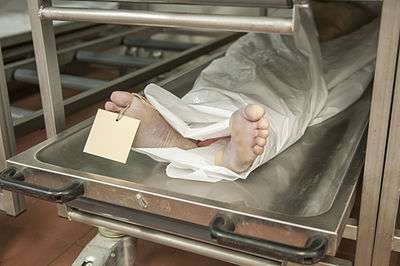Medical jurisprudence
Medical jurisprudence or legal medicine is the branch of science and medicine involving the study and application of scientific and medical knowledge to legal problems, such as inquests, and in the field of law.[1] As modern medicine is a legal creation, regulated by the state, and medicolegal cases involving death, rape, paternity, etc. require a medical practitioner to produce evidence and appear as an expert witness, these two fields have traditionally been interdependent.[2]
| Part of a series on |
| Forensic science |
|---|
 |
|
|
|
|
|
|
|


Forensic medicine, which includes forensic pathology, is a narrower frontline field which involves the collection, documentation, analysis and presentation of objective information (medical evidence) for use in the legal system.[3]
History
Paul Zacchias is one of the earliest figures of medical jurisprudence, with association with the Papal States and Catholic church.[4] Zacchias was the personal physician to Pope Innocentius X and Pope Alexander VII, as well as legal adviser to the Rota Romana.[5] His most well known book, Quaestiones medico-legales (1621-1651) established legal medicine as a topic of study.[6] Zacchias work contains superstitious views on magic, witches, and demons which were widely held at the time.[7]
Medical jurisprudence had a chair founded at the University of Edinburgh in 1807, first occupied by Andrew Duncan, the younger. It was imposed on the university by the administration of Charles James Fox, and in particular Henry Erskine working with Andrew Duncan, the elder.[8]
Scope
Medical jurisprudence is concerned with a broad range of medical, legal, and ethical issues, as well as human rights and rights of individuals.
Physicians have a duty to act in their patients best interest and can be charged in a court of law if they fail to do so. On the other hand, a physician may be required to act in the interest of third parties if his patient is a danger to others. Failure to do so may lead to legal action against the physician.
Medical jurisprudence includes:
- questions of the legal and ethical duties of physicians;
- questions affecting the civil
Under the second heading, there are many aspects, including:
- questions of competence or sanity in civil or criminal proceedings;
- questions of competence of minors in matters affecting their own health; and,
- questions of lawful fitness or safety to drive a motor vehicle, pilot an aeroplane, use scuba gear, play certain sports, or to join certain occupations.
Under the third heading, there are also many aspects, including:
- assessment of illness or injuries that may be work-related (see workers' compensation or occupational safety and health) or otherwise compensable;
- assessment of injuries of minors that may relate to neglect or abuse; and,
- certification of death or else the assessment of possible causes of death. This, however, is the more commonly understood, albeit narrow, meaning of forensic medicine.
References
- Theodric Romeyn Beck and William Dunloop. (1825.) Elements of Medical Jurisprudence, 2 ed., Oxford University Press.
- James C. Mohr. (1993.) Doctors and the Law: Medical Jurisprudence in Nineteenth-Century America, Oxford University Press, New York City.
- Alfred Swaine Taylor and Frederick John Smith (ed.). (1920.) Taylor's Principles and Practice of Medical Jurisprudence, 7 ed., Taylor & Francis. (1873 edition)
- Hartnup, Karen (2004-01-01). 'On the Beliefs of the Greeks': Leo Allatios and Popular Orthodoxy. BRILL. ISBN 9004131809.
- Medico-Legal Society of New York (1885). The Medico-legal journal, Volume 2. Medico-Legal Journal Association.
- JAMA.: The Journal of the American Medical Association, Volume 38. American Medical Association, HighWire Press. 1902. p. 618.
- Northwestern lancet, Volume 18. 1898.
- White, Brenda M. "Duncan, Andrew (1773–1832)". Oxford Dictionary of National Biography (online ed.). Oxford University Press. doi:10.1093/ref:odnb/8213.(Subscription or UK public library membership required.)
External links
